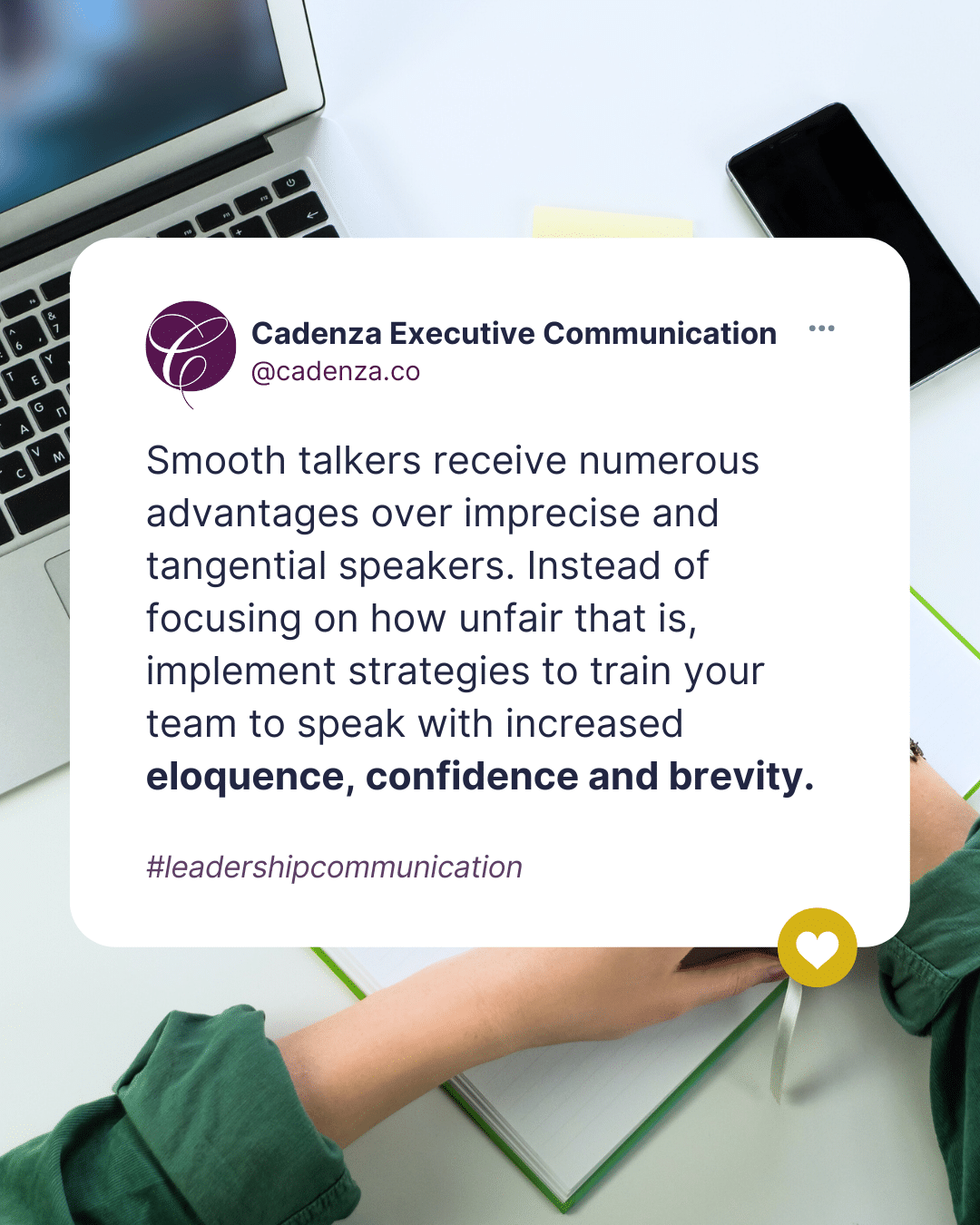Leadership Communication
The Secret to Winning with Your Team: 5 Essential People Skills
Learn to the people skills that you need to develop a successful team.

he age of digital transformation calls for purposeful investment in people skills, not only to recession-proof one’s career path but also to create thriving organisations in the marketplace.This article will provide a solid starting point if you want to transform your team with powerful people skills.
Today we’ll investigate the following:
- Five overlooked people skills that will allow your team, brand and organisation to thrive in the marketplace
- How advanced people skills protect your brand, organisation and company from key risks
- Three approaches to incorporating concrete people skills training into your company’s infrastructure.
This blog post is best digested in 3 parts:
- Check the tips summarised below.
- Watch the vlog for more detailed insights from our director, Sarah.
- Book a discovery call to learn how CADENZA B2B services can help you build an unstoppable team with exceptional people skills.
While this article has been prepared with team leaders, executives and CEO’s in mind, keep reading if you are an employee as you’ll no doubt find topics covered fruitful for your personal career development.
Unveiling the Key to Team Success: 5 Overlooked People Skills
Search for people skills on the internet, and you’ll meet a deluge of posts with examples of people skills and a few pertinent articles about how replicable emotions are in robots, with a discussion of industries, professions and tasks that may soon become obsolete.
We’ll not take this pathway, since at Cadenza we attest that:

Let’s investigate five beneficial people skills that are worth developing among your team, according to research.
#1 Self-regulation skills
Have you noticed team members caught off guard, under pressure or struggling to control their emotions when interacting with colleagues, clients and stakeholders?
Self-regulation difficulties leave traces commonly observable in a team member’s speaking style.
Here are some common clues that your employee or team member may be finding it challenging to present their ideas due to difficulty streamlining their thoughts and emotions:
- mumbling
- hesitations
- speaking too fast
- speaking too slowly
- tangential responses
- explosive outbursts
- awkward responses
- self-deprecating remarks
- excessive facial movements, jerky gestures
- speaking up less than required in meetings
- weak rapport with key stakeholders
- conversation avoidance
- Negative remarks and comments about workflow, lack of support
There is room for significant variation between interaction styles; employees will be different in managing their emotions, responding to workplace pressure and positioning themselves. If you’re aiming to showcase effective people management skills with your team, a degree of tolerance for a diverse mix of temperaments, personalities and speaking styles is needed; however, don’t be too laissez-faire with any communication breakdowns you notice occurring in your team due to barriers to self-regulation among team members because you can implement professional development opportunities with your team in the area of self-regulation which will have a profound impact on their personal development and KPIs.
In many cases, one of the most effective ways to get a return on your investment with team members is to consider investing in a communication training program with solid attention to developing enhanced self-regulation skills. This approach is an excellent way to roll out a workforce of confident communicators. Self-regulation is not so much about pretending to have everything under control or masking neurodivergent behaviour. Still, it is more about equipping your team with communication tools that help them decompress in the heat of the moment, especially when faced with high-pressure conversations, so that they can reduce interpersonal pressure and hear themselves communicating with responses they are proud of.
Equipping your team with self-regulation training may be one of the best ways to reduce the incidence of burnout, according to Bakker & de Vries (2020). Burnout theory commonly defines burnout as the outcome of “high job demands and low job resources (Bakker & de Vries, 2021).” Rolling out self-regulation tools across your organisation is a concrete way to build up the people skills on your team. It will also provide your staff with increased protection from burnout since self-regulation methods equip your personnel with increased emotional intelligence capacity, particularly in regulating and decompressing their emotions.
Burnout is not the only risk factor for staff who lack self-regulation resources and tools.
Staff that speak well under pressure will solve problems better under pressure.
What happens to team members without self-regulation skills for high-pressure situations, conversations and conflicts? The likely outcome is maladaptive self-regulation. Failure to decompress our emotions, work pressure and interpersonal pressure will increase the risk of negative emotions like anger, sadness, and irritation (Bakker & de Vries, 2021), which has a deleterious link to cognitive agility. Maladaptive self-regulation is shared among team members that struggle to present their ideas eloquently, which spirals a vicious cycle of self-undermining, reduced participation in critical conversations, even raising the likelihood of workplace mistakes, weaker problem-solving skills and avoidance coping, leading to lower engagement levels, reduced productivity and inefficient teamwork.
It takes 90-seconds for the brain to identify an emotion and decompress it. Without communication tactics, self-regulation will not be possible in pressure cooker situations.
Competent communicators can self-regulate and deliver poised responses no matter the context, conversation partner or work environment pressures that threaten to crush them.
A core part of our communication assessment process considers a detailed assessment of speaking comfort to diagnose the key areas the speaker needs to enhance self-regulation.
Problems with regulating speaking delivery and message when faced with conflict, anxiety-inducing discussions or difficult people present a severe risk to personal impression management for the individual and even brand credibility for an organisation.
🔗 Related blog post: 32 Leadership Soft Skills that will Protect your Value at Work

#2 Logical speaking skills
Suppose you’re responsible for people management with a team of staff with analytical and technical prowess. In that case, you will no doubt notice some challenges among various individuals when synthesising their thought processes with the act of speaking. Logical thinking does not always preclude logical speaking. Unfortunately, in most cases, your clients, stakeholders and senior leaders will rate the competence of your staff member on the integrity of their speaking logic. Eloquence activates cognitive sophistication bias. “Well-planned and structured explanations result in greater understanding and better retention of the verbal content, and thus in more successful interpersonal transactions”, and speakers that sound good tend to be seen as more “involved, trustworthy and powerful (Strangert & Gustafson, 2008).”
It’s normal to note a gap between logical thinking and speaking in tech-heavy teams. Still, the good news is that you can implement effective communication training that transforms analytical thinkers into logical speakers. And the benefits far outweigh the cost investment because you’ll notice the following perks if your team is better equipped with the skill of precise and concise speaking:
- More efficient meetings- staff will use fewer tangents, hesitations and fillers to share ideas.
- Increased productivity- staff that can relay core information precisely will gain more traction as a team in solving problems, completing projects and refining processes.
- Access to a deeper pool of ideas to fire innovation, problem-solving and improved systems development- staff that feel secure in presenting their viewpoints precisely will be more inclined to contribute their ideas than sit back ruminating.
- Improved interactions in the customer-facing environment- precise communicators tend to win deeper trust, competence and rapport ratings (Strangert & Gustafson, 2008).

#3 Tactical empathy
Empathy receives considerable positive press for its role in building interpersonal benevolence, but it also has merit at an organisational level in more ways than one!
Tactical empathy training will add value to the interpersonal relationships that drive business and reduce the risk of socially deviant behaviour within the workforce.
Empathy skills will raise the cognitive potential of your team. It has been shown to encourage intellectual flexibility by increasing perspective-taking, expanding reasoning and optimising interpersonal relationships (Cartabuke et al., 2019).
An empathy deficit in your organisation will increase the risk of microaggressions- the most toxic and potentially rampant workplace communication barrier that marginalises team members and deteriorates their health and well-being (Bond and Haynes, 2021). Tactical empathy training will reduce the incidence of anti-social behaviour by equipping your team members with a concrete system to “evaluate the adverse effects of their possible actions and decisions.” Science-based social intelligence training is the best way to increase tactical empathy across your team. But before we get to that, here are some communication clues that indicate your team could benefit from tactical empathy training:
- Speaking with less persuasive impact and influence
- Conflict management barriers
- Poor customer experience in service and product-based interactions
- Avoidance of challenging topics and conversations
- Difficulty building team unity and vision across an organisation due to weak leadership communication and emotional intelligence
- Interpersonal tension or conflict with stakeholders and team members
#4 Conflict de-escalation skills
One of the most long-reaching investments in people skills across your team, organisation and company is training your staff in conflict de-escalation skills. Most humans are understandably conflict-avoidant at work, which can be a surefire way to destroy the integrity of your brand, product and services. When you equip your team with conflict de-escalation skills, you’ll give them the necessary tools to secure their professional reputation with key stakeholders and potentially avert conflict and negative word of mouth.
Conflict de-escalation pivots around trust repair secured by impeccable communication skills training that explicitly addresses conflict, customer experience and plausible product/ service risks within your organisation. In this regard, it’s best to take a preventative and proactive approach and roll out customised training built around your workplace model. At Cadenza we provide training, workshops and consulting services to prepare your team in a streamlined and unified conflict de-escalation approach. Here the end goal is that your entire team can rapidly implement recovery strategies that restore a premium customer or stakeholder experience, no matter how disgruntled or disenchanted the dissatisfied party is.
Developing a bespoke approach to conflict de-escalation with an expert communication consultant is a unique opportunity for you to showcase your brand difference in internal processes and how your team relates with the marketplace. Most companies and organisations fall short in conflict repair and customer experience. Failing to implement a conflict repair strategy throughout your organisation will increase the chance of disgruntled team members and clients.
Equipping your team with skills in this area will have far-reaching benefits that set your organisation apart from others in the industry.
🔗 Related blog post: How to Successfully De-esclate an Angry Customer or Client
#5 Presenting skills
Presentation literacy is vital for building credibility, enhancing reputation management, and connecting with your audience and one of the final frontiers to clear to open the pathway to competent, resilient and effective communicators in your team. Presenting skills are relevant to all industries, you don’t need to be in the performing arts, legal or entertainment sector to benefit from oratory skills.
It’s estimated that 77% of people dread public speaking– do the maths. Let’s consider how many people are on your team. Calculate how many on your team are likely to face presenting anxiety and now consider this: people count many workplace interactions as public speaking events.
In our work with 1000s of employees to upskill them with elite communication skills, we take inventory on their most challenging communication interactions. Here is a list of typical workplace activities taken from our extensive assessment data that our clients ascribe as a public speaking activity:
- Raising opposing views or unique insights in team meetings or group scenarios
- Participating in stand up meetings
- Meeting with the board
- Pitching a product to a group of stakeholders
- Sharing insights in a leadership meeting
- Networking in a small group at a conference or work expo
- Expressing oneself confidently in larger work groups
- Delivering a powerpoint presentation to colleagues, stakeholders or teams from a different department
- Chairing a meeting so that it runs smoothly and in a timely manner
- Initiating conversation in a group setting
- Entering an ongoing group conversation
Investing in the presenting skills of your employees and team will fast track speaking confidence, tighten participation of your team members in vital work tasks and enable your staff to reach heightened confidence and develop elite people skills that enhance team engagement, productivity and competitive advantage in the marketplace.
Training the people skills in your team, organisation and company will positively impact performance, sense of belonging and the reputation for each individual and your brand at large.
Every investment you make in your team’s communication skills is an investment in their wellbeing. At CADENZA we relish the opportunity to assist you to create confidence and engaged employees with the power to express their ideas, solutions and insights with precision, charisma and purpose. If you’d like to learn more about how we can assist you in this area, get in touch today.
Book your Discovery Call
References
-
Bakker, A. B. and J. D. de Vries (2021). “Job Demands-Resources theory and self-regulation: new explanations and remedies for job burnout.” Anxiety Stress Coping 34(1): 1-21.
-
Strangert, E. and J. Gustafson (2008). What makes a good speaker? subject ratings, acoustic measurements and perceptual evaluations. INTERSPEECH.
-
Weinstein, A. and C. Patrick (2019). “Recession‐Proof Skills, Cities, and Resilience in Economic Downturns.” Journal of Regional Science 60.
-
Cartabuke, M., et al. (2019). “Empathy as an antecedent of social justice attitudes and perceptions.” Springer, doi:10.1007/s10551-017-3677-1.
Did you enjoy this post? Make sure to subscribe to our YouTube channel to get more content to increase your communication skills!
About the Author
Dr Sarah Lobegeiger de Rodriguez is a Keynote Speaker, Executive Speaking Coach, and Opera Singer who likes to play with words, sounds, and your impact.
Her academic background is in Music Performance, Communication Science and Speech & Language Pathology. She assists executive communication clients all over the world as a communication consultant with strong expertise in CEO, Founder and Entrepreneur communication strategies.
Connect with Sarah on LinkedIn.
© CADENZA
Level 14, 380 St Kilda Road, Melbourne, 3004
Privacy Policy
Terms & Conditions
Position Statement on Racism
